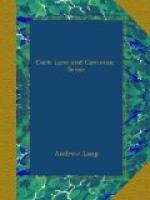In the second place, crystal-gazing shows how a substratum of fact may be so overlaid with mystic mummeries, incantations, fumigations, pentacles: and so overwhelmed in superstitious interpretations, introducing fairies and spirits, that the facts run the risk of being swept away in the litter and dust of nonsense. Science has hardly thought crystal-gazing worthy even of contempt, yet it appears to deserve the notice of psychologists. To persons who can ‘scry,’ and who do not see hideous illusions, or become hypnotised, or superstitious, or incur headaches, scrying is a harmless gateway into Les Paradis Artificiels. ’And the rest, they may live and learn.’ {223}
A very few experiments will show people whether they are scryers, or not. The phenomena, it seems, are usually preceded by a mistiness, or milkiness, of the glass: this clears off, and pictures appear. Even the best scryers often fail to see anything in the crystal which maintains its natural ‘diaphaneity,’ as Dr. Dee says. Thus the conditions under which the scryer can scry, are, as yet, unascertained.
The phenomena of scrying were not unknown to Dr. Gregory, Professor of Chemistry in the University of Edinburgh. Dr. Gregory believed in ‘odylic fluid’ on the evidence of Reichenbach’s experiments, which nobody seems to have repeated successfully under strict tests. Clairvoyance also was part of Dr. Gregory’s faith, and, to be fair, phenomena were exhibited at his house, in the presence of a learned and distinguished witness known to the writer, which could only be accounted for either by thought transference, or by an almost, or quite incredible combination of astuteness, and imposture on the side of Dr. Gregory himself. In presence of the clairvoyants the nobleman of whom we speak thought not of his own house, but of a room in the house of a friend. It possessed a very singular feature which it is needless to describe here, but which was entirely out of the experience of the clairvoyante. She described it, however, expressing astonishment at what she ‘saw’. This, unless Dr. Gregory guessed what was likely to be thought of, and was guilty of collusion, can only be explained by thought transference. In other cases the doctor was convinced that he had evidence of actual clairvoyance, and it is difficult to estimate the amount of evidence which will clear such a belief of the charge of credulity. As to ‘scrying’ the doctor thought it could be done in ‘mesmerised water,’ water bewitched. There is no reason to imagine that ‘mesmerised’ is different from ordinary water. {224} He knew that folklore retained the belief in scrying in crystal balls, and added some superfluous magical incantations. The doctor himself was lucky enough to buy an old magical crystal in which some boys, after long staring, saw persons unknown to themselves, but known to the professor, and also persons known to neither. A little girl, casually picking up a crystal ball, cried, ’There’s




